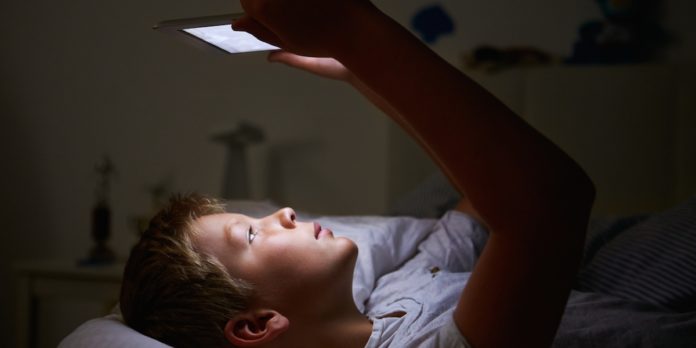
A 2014 combined project by Oxford, Cambridge, Harvard, Manchester and Surrey Universities declared, ‘Society has become supremely arrogant in ignoring the importance of sleep’. The researchers cite living in a 24hour society coupled with technology overuse as part of the issue.
The National Sleep Foundation in the US found that more than half of the parents surveyed said their 15 to 17 year-olds routinely get seven or fewer hours of sleep. That is less than most adults, at a time when the brain needs more sleep for growth, development and learning.
Which means these teens are chronically sleep deprived over the long term.
How much time is recommended for teenagers?
* Older teenagers need 8 1/2 to 10 hours of sleep per night
* Younger teens need 9 to 10 hours/night
* Young children need 10 to 11 hours per night
What is the effect of blue light on sleepiness?
There are numerous brain studies that show melatonin, a hormone associated with nighttime, signals that it is time to sleep. The pineal gland, an organ in the brain about the size of a pea, begins to release melatonin a couple of hours before your regular bedtime, and light — particularly of the blue variety — can keep the pineal gland from releasing melatonin – affecting the onset of sleepiness.
The problem is, although most of our screens emit light of all colours, it is their blues in particular that pose a danger to sleep. Blue light is especially good at preventing the release of melatonin. In fact, you don’t even have to be staring directly at a television or computer screen; if enough blue light hits the eye, the gland can stop releasing melatonin.
The latest study by Steven Lockley of Harvard Medical School found that Teenagers are more vulnerable to the effects of light than adults. Even when exposed to just one-tenth as much light as adults were, the teens actually suppressed more melatonin than older people. During adolescence, the circadian rhythm shifts, and teens feel more awake later at night, so switching on a TV screen or video game just before bedtime will push off sleepiness even later.
What is affected when sleep is lacking?
For teens, sleep is vitally important for learning, memory, brain development and health.
Sleep influences 4 main areas:
1. Physiological (body systems, like cardiovascular and endocrine systems and physical health)
2. Psychological (emotional and mental health)
3. Psychosocial (behaviour, peer and family relationships)
4. Cognitive (learning, attention, problem solving)
My colleagues and I sometimes see teens misdiagnosed with ADHD, depression or other issues, when they are in fact sleep deprived and nobody has questioned their sleep habits. Additionally, teens already struggling with anxiety or depression, learning difficulties etc, will find their symptoms exacerbated when their brains are starved of sleep.
Hence, when we systematically allow our children to go to bed late we are sleep- depriving them during a time when their brains are still developing, and you couldn’t design a worse system for learning.
Recognising sleep deprivation:
Some teens display tiredness, not by yawning or falling asleep on the desk at school, but by emotional outbursts, crying or bouts of anger. This understandably affects their relationships with both adults and peers.
Recommended pre-sleep wind down.
* Get active during the day to boost sleep at night.
* Eat dinner a few hours before bed (a small snack later on is fine)
* Switch off screens an hour before bedtime – at a minimum.
* Get into a good bedtime routine – this gets the brain prepared for sleep.
* Engage in reading activities at bedtime, rather than games or shows with flashing lights and movement.
But what about evening homework?
When homework needs to be done, turn the brightness setting down on laptops and tablets. You could also make use of software options which automatically warm up the colours on computer screens and handhelds i.e. more reds and yellows at sunset and returns them to normal at sunrise.
It has also been said that the distance between your eyes and the device, as well as the size of the screen, makes a difference to the effects on the brain. In other words, place the tablet farther away from your face than usual (although I’m not sure how practical this is to do).
Indeed, teens should not regularly be doing homework, sport or hours of musical instrument practice much past 8:30pm (I mention instrument practice because some teens are expected to rehearse for an hour or 2 every night, after homework, which leads to a 10pm+ bedtime). Later bedtimes, on rare occasions, for short periods or if there is an important assignment due, will naturally happen. However, if this happens regularly contact the school and request an adjustment to homework.
I also recommend that parents allow teenagers, who work better during the evening, to have an after school nap. Some teenagers prefer this option and this allows them to still get the recommended hours of sleep within a 24 hour cycle.
The bottom line according to Dr, Seton is, “There’s a strong correlation between electronic media usage and sleep deprivation. It doesn’t matter how good the education is; if kids are tired, the learning is futile.”
Collett Smart is a registered psychologist, psychology tutor at UWS, speaker, freelance writer and mum of 3. She writes on her blog ‘Raising Teenagers’ here. You can follow here on Twitter at @collettsmart and on her Facebook page here.
Source: http://www.generationnext.com.au/2014/11/teen-sleep-deprivation-effect-blue-light/
